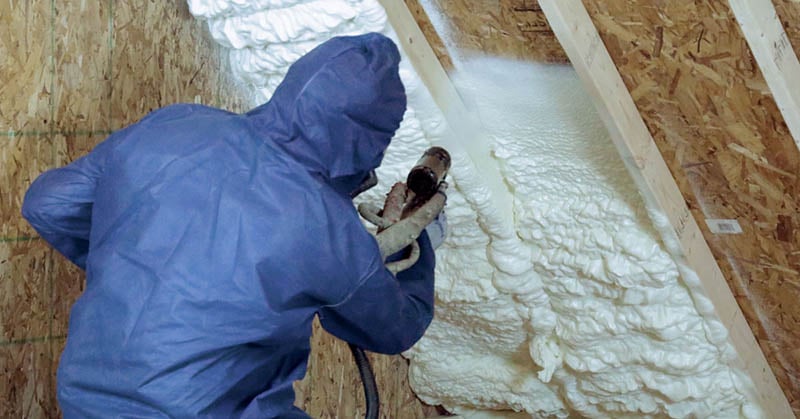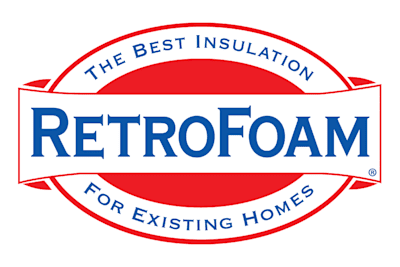Is There a Spray Foam Insulation Mortgage Problem in the U.S.?


All it takes is a spark before things get out of hand.
A tiny ember spreads into this raging thing that becomes difficult to contain.
I’m not talking about a literal fire, but the spread of inaccurate information across the internet.
When people don’t double-check where an article is coming from or who the intended audience is, it can lead to a lot of confusion. This is how the thought of spray foam insulation mortgage problems came about.
You’re worried now that you won’t be able to sell or refinance your home because you either have spray foam in the attic, or you’re considering adding it.
Some of our dealers across the country offer our RetroFoam injection foam, and they also offer spray foam as part of a whole-house system. We have been running into homeowners who have read articles stating that selling a house with spray foam insulation is nearly impossible because mortgage companies will deny the loan.
We’ll dive into this thought in a bit, but it’s important to note that the problem is actually in the United Kingdom, not here in the U.S.
But let’s not get ahead of ourselves. Instead, let’s get to all the facts about spray foam insulation and mortgages.
Does Spray Foam Insulation Affect a Mortgage in the U.S.?
Is spray foam insulation in the attic a problem for U.S. mortgages? Not according to one professional and hours of searching the internet.
Honestly, the only legitimate articles I could find regarding spray foam insulation mortgage problems were in the U.K. Sure, I found forums talking about it, but there were only references to U.K. articles, speculation, and misinformation.
Darren Tooley is a loan officer in the U.S. and the sales manager at Caliber Home Loans. Tooley said he could find some articles from the U.K. about the issue, but this was the first he had heard about it.
“I have been doing this over 20 years now, and I can honestly say I can’t recall that ever coming up,” Tooley said.
In his experience, Tooley said the closest thing he knew of would be the home appraisals for FHA and VA loans. Looking over the requirements for these loans regarding insulation, Tooley said he didn’t see any problems here either.
“These (websites) have the requirements, and I don’t see anything that would forbid foam installation as long as it meets the requirements like ‘adequately insulated,’ ‘not deficient materials,’ and ‘adequate venting.’”
You can read through the requirements for the U.S. Department of Housing and Urban Development here and the FHA requirements here.
In a nutshell, there aren’t any indications in the U.S. that adding spray foam insulation to an attic will cause mortgage problems.
Spray Foam Insulation Mortgage Problem in the U.K.
Spray foam insulation can help prevent air leakage into and out of a home, making it a key element of energy efficiency.
The government in the U.K. supports and helps fund spray foam insulation as an energy-saving measure, but some risks have been identified.
There have been a lot of reports in the U.K. from both the media and the construction industries suggesting that homeowners have found it difficult, if not impossible, to remortgage or sell homes with spray foam insulation in the attic.
TL;DR: Lenders are concerned about the long-term issues poorly applied spray foam insulation can cause to roofs. This also leaves inspectors concerned about their professional liabilities and feel duty-bound to their clients.
Spray foam insulation has been used in many homes across the country for decades, but more recently, there have been reports of problems in timber-framed dwellings, according to the U.K. Parliament.
The real issue at hand is that if the spray foam is installed improperly on the roof deck, it could lead to condensation, which in turn would damage the roof and cause the timber to rot. The Royal Institution of Chartered Surveyors (RICS) stated that spray foam on the roof deck could hinder the roof inspection if applied incorrectly.
The Home Owners Alliance (HOA) is a consumer group that advises homeowners. It stated that because spray foam on the roof deck covers the roof’s structure, a surveyor appointed by a mortgage company would find it difficult to identify risks and the roof's current condition. This and reports of poor workmanship and taking advantage of vulnerable groups with high-pressure sales have been at the forefront of changing industry guidance.
In November 2021, the Residential Property Surveyors Association (RPSA) and Property Care Association (PCA) together published a report that deemed it “unlikely” that inspectors could decide about the health of the timber roof structure or potential risks. At that time, they also recommended the surveyors suggest that the spray foam insulation be removed from the homes.
This report was withdrawn in October 2022, as spray foam industry stakeholders spoke out about inaccuracies in the information. In March 2023, the PCA published an inspection framework for surveyors that can help them assess the risks of spray foam insulation in pitched roofs and decide on the condition of individual roofs instead of a blanket determination because spray foam is present.
For the next steps, the PCA recommends that the spray foam industry in the U.K. create a system of controls for suppliers and installers. This would allow the installations to be measured and verified against the product approval certificates.
A final thing to note regarding spray foam insulation and mortgages in the U.K. is that not all lenders refuse to finance or refinance a home if the material is found in the attic. All lenders have their own rules for spray foam, and those rules are changing.
Learn More About Foam Insulation for Your Home
Hopefully, the information in this article has put your mind at ease.
Adding foam insulation to your home and sealing the entire building envelope from top to bottom can create an energy-efficient space and the comfortable home you’ve always wanted.
If you’d like to dive in to research foam insulation further, check out the Learning Center on our website.
Related Articles
Is RetroFoam Eligible for the Inflation Reduction Act Energy-Efficient Home Improvement Credit?
Clearing Up Misconceptions About Injection Foam Insulation
The Truth Behind the RetroFoam Canada Lawsuit and Formaldehyde
About Amanda Emery
Amanda previously has worked as a breaking news and crime reporter, TV news producer, and editor. As a journalist, she has won several awards from The Society of Professional Journalists - Detroit Chapter and the Michigan Press Association. Amanda uses her experience as a journalist to write content that will help educate homeowners on foam insulation benefits. When Amanda isn’t writing, she’s spending time with her husband Chris, daughter Lilith-Maeve, and rescued huskies Danger and Wendigo. She also loves knitting, making art, and cooking.


